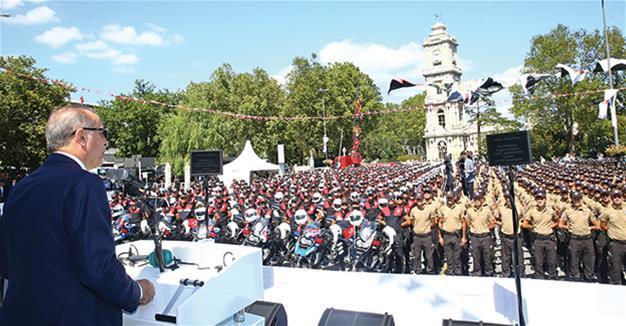New Turkish state of emergency decrees ties intelligence agency to president
Oya Armutçu - ANKARA
 The government issued two major new state of emergency decrees on Aug. 25, making big changes to the organizational structure of the National Intelligence Agency (MİT) by bringing it under the authority of the president and re-activating intelligence gathering activities within the military.
The government issued two major new state of emergency decrees on Aug. 25, making big changes to the organizational structure of the National Intelligence Agency (MİT) by bringing it under the authority of the president and re-activating intelligence gathering activities within the military.As a part of the decrees, numbered 963 and 964 and published in the Official Gazette, responsibility for the MİT undersecretary was taken from the office of the prime minister and given to the president. Accordingly, the MİT undersecretary and its top management, including deputy undersecretaries and heads, will be directly appointed by the President.
Any investigation of the MİT undersecretary will now have to be approved first by the president and any testimony given by the MİT undersecretary will also have to be approved by the president. Authorization to conduct investigations about the MİT undersecretary will also have to be submitted for approval by the president.
Commenting on the move, Prime Minister Binali Yıldırım stated on Aug. 25 that the change was aimed at bringing the organization into compliance with the executive presidential system, approved narrowly in a contested referendum in April 2017.
“When we take the April 16 referendum into consideration, the MİT and other institutions will already be incorporated under the presidency in the new system. So the latest changes are compatible with the spirit of the April 16 governance system shift,” Yıldırım told reporters in the capital Ankara on Aug. 25.
“Rules constitute the basis of public institutions and also constitute the basis of the fact that everyone has to do the duties and responsibilities assigned to them. So interpreting this issue as a sign of distrust in the prime minister is ill-willed,” he added.
In addition, the decree also granted authorization to the MİT to gather intelligence about the Turkish Armed Forces and its personnel, as well as Defense Ministry personnel, an implementation that was abandoned six years ago.
The MİT had not previously been authorized to gather intelligence about the Armed Forces and military staff until 1997. However, an assassination attempt targeting then Chief of General Staff Hüseyin Kıvrıkoğlu during a drill in the Turkish Republic of Northern Cyprus revealed deficiencies about intelligence gathering within the military, prompting the change. On Nov. 28, 2011 the MİT’s intelligence gathering authorization inside the military were removed for a second time following a circular issued by the Chief of General Staff Necdet Özel.
According to the latest change, MİT personnel will now be able to conduct any kind of investigation into Defense Ministry personnel and Turkish Armed Forces personnel.
The procedures and principles on intelligence gathering activities, along with the duties of other institutions, will be determined in a MİT circular that will be issued upon the president’s confirmation.
It is reported that a protocol may now be signed between the MİT and the Armed Forces in a way that “will not harm mutual trust” between the two institutions regarding the changes.
Meanwhile, according to the decree the National Intelligence Coordination Board (MİKK), which has been under the MİT, will also come under the authority of the presidency, with the president presiding over the board.
The board’s duties are defined as “providing a coordination regarding the fulfillment of the duties and obligations of the ministries and other public institutions and establishing and implementing basic principles of the directives of intelligence work.”
“The secretariat duties of the board will be implemented by the [MİT] undersecretary,” it read.
Also, jail terms of between three and seven years will be given to people who disclose the position, duties and activities of MİT personnel, in addition to disclosing the identities of MİT staff and their families.
In addition, personnel who “have been unable to adjust themselves to the conditions and qualifications” of the intelligence service within the MİT will be reported to the state personnel directorate for a 10-day re-assignment process. The related personnel will be dismissed from the MİT within a maximum of 17 days.
Separately, the decrees include more than 200 articles making annexes and amendments to more than 100 laws or decrees.
Decree number 963 dismissed a total of 928 public officials from their positions and reinstated 60 officials, while closing six institutions including the Kurdish issue-focused news agencies Dicle Media, Sujin and Rojava News Media. It also opened 4,000 new judge and prosecutor posts, along with new positions in the police forces and the Justice Ministry.
The number 964 included 205 articles making extensive regulations to over 100 laws or decrees. The regulations covered national intelligence activities, the organization of the military and military schools, health organizations, reinstatement of public officials, and the administrative structure of the state.
It also gathered together all the investigations to be carried out into lawmakers regarding deeds committed either before or after they were elected as a lawmaker within the Ankara Public Prosecutor’s Office.
In addition, it also stated that the dismissed academics who were reinstated to their posts by the State of Emergency Commission will not be appointed to their initial institution.
















